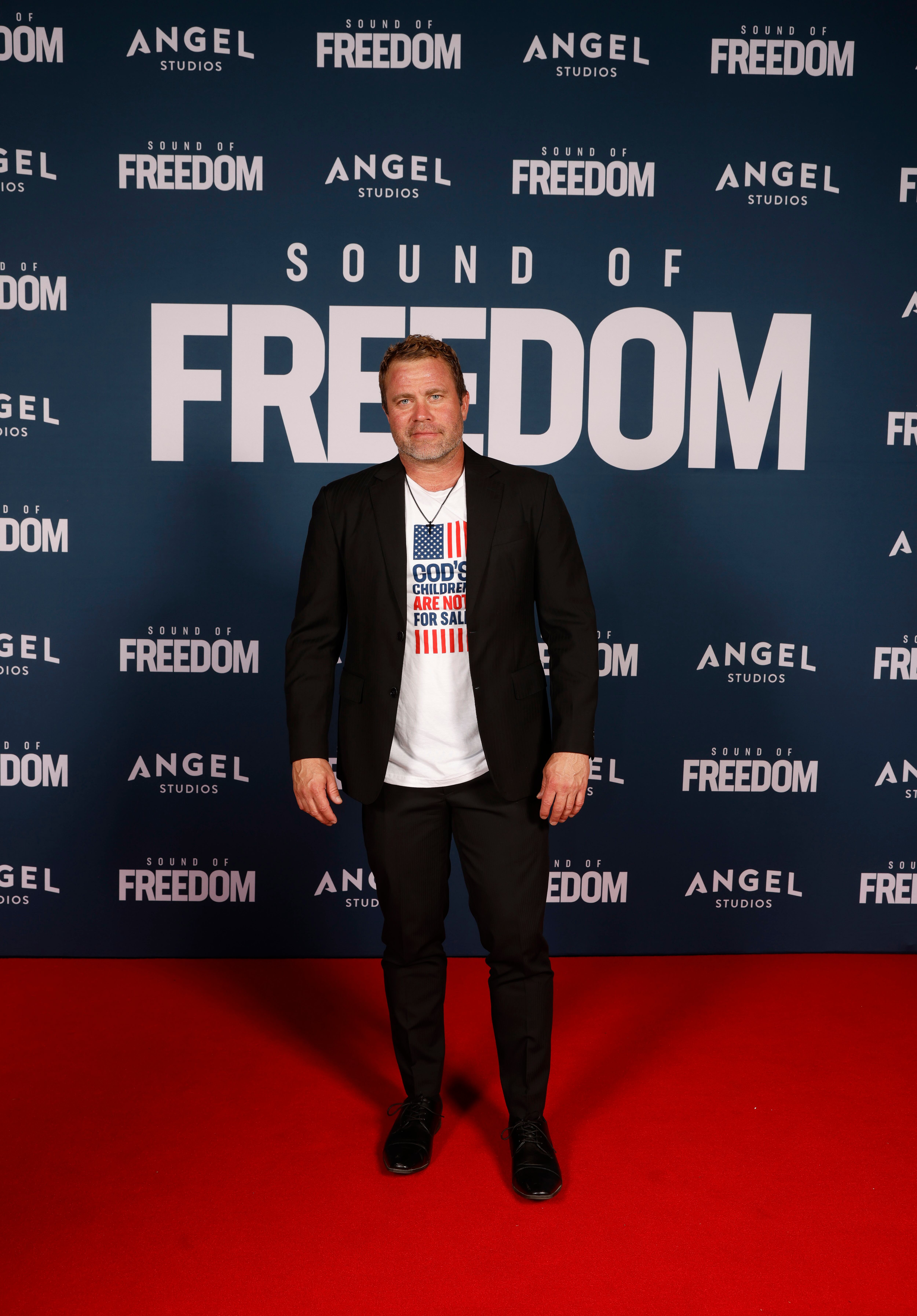U.S. Southern Command planned, and then canceled, two showings of the Christian-faith-based thriller “Sound of Freedom” at its headquarters this summer. The movie’s been a runaway hit, grossing more than $200 million, but its lead actor has publicly linked the film’s anti-sex-trafficking plot to baseless QAnon conspiracy theories.
By playing the movie on a federal base, some critics have questioned whether SOUTHCOM’s leadership is following a policy that requires troops to remain apolitical at work – as QAnon followers have spread false rumors about and bashed President Joe Biden’s administration – and to maintain a separation of church and state, considering the film’s heavy Christian narrative.
“What is the idea and the ideology behind putting this on a military installation? Is this some form of indoctrination into an ideology of extremism?” asks human trafficking and exploitation consultant Sunnetta “Sunny” Slaughter, referring to the anti-government QAnon tropes being doled out by the film’s main actor Jim Caviezel, while promoting the film. According to the Associated Press, Caviezel has denied QAnon ties yet spoke at a QAnon-organized convention in 2021 and espoused several of the theory’s talking points on conservative talk shows hosted by Steve Bannon and Charlie Kirk.
The free screenings were originally planned for Aug. 28 and Oct. 19. The emailed flyer from U.S. Army Garrison-Miami manager Joanne B. Fitzgerald, obtained by Military Times, invited all locally based personnel to attend. It said it was being shown “In support of SOUTHCOM’s mission to promote respect for human rights and combating trafficking in persons in Central and South America and the Caribbean.” The bottom of the invite also stated, “The showing of this film does not imply or constitute endorsement by the U.S. Army nor SOUTHCOM.”
After Military Times initially inquired about the film’s scheduled showings, SOUTHCOM nixed the event, explaining in an email to the base that the free screenings were canceled until further notice in order to “prevent the appearance of copyright infringement.” But the emailed missive, obtained by Military Times, added that “the film is currently available to view at local theaters, and personnel and their families who would like to see the film are encouraged to do so.
“The movie’s central theme and its connection to SOUTHCOM’s AOR and our Human Rights Office (HRO) Combatting Trafficking in Persons (CTIP) program are inescapable and will serve to raise awareness of the prevalence of trafficking in human persons and sexual abuse and exploitation within our area of responsibility,” it said.
And SOUTHCOM spokesman Jose Ruiz defended the initial planned screening, telling Military Times that the movie’s central theme of combatting human trafficking in Latin America intertwines with the command’s area of responsibility and its mission, which includes protecting human rights.
“The subject of the movie is something that’s of great concern to the command, in that it follows as part of its mission of countering transnational criminal organizations,” Ruiz said. “Because of the way these transnational criminal organizations exploit migrants — the hopes of migrants — in ways that end up being serious violations to their human rights, and unfortunately in some cases lead to the deaths of the migrants.”

“Sound of Freedom” is based on the work of Timothy Ballard, who claims he worked for the CIA and the Department of Homeland Security, before launching the controversial anti-child-sex-trafficking group, Operation Underground Railroad. The activist group stages and films “stings” to round up traffickers in developing countries, at the invitation of foreign law enforcement, according to the group’s site. But the organization has been publicly maligned for allegedly creating more media frenzy and attention for Ballard than solutions for the rescued victims.
In the film, actor Jim Caviezel’s character is a former CIA officer who quits his job after his bosses refuse to authorize rescuing a Honduran girl from a Colombian sex-trafficking cartel.
At a film screening in London, director Alejandro Monteverde denied that the movie had anything to do with QAnon ideology, a sweeping collection of unfounded and disproven theories that revolve around the concept that the U.S. government is run by a secret faction of pedophiles. QAnon adherents also embrace former President Donald Trump and the false narrative that the 2020 election was stolen.
Yet after the film’s release, Caviezel publicly touted QAnon-aligned conspiracy theories on conservative talk shows and events organized by QAnon groups, per videos posted by Media Matters’ Eric Hananoki. Widely known for his role as Jesus of Nazareth in Mel Gibson’s 2004 film “The Passion of the Christ,” Caviezel repeated the baseless QAnon claim that “liberal elites” are part of an elaborate scheme to kidnap children and harvest their blood for adrenochrome, a real chemical compound, to experience euphoria. (Scientists say that’s not what adrenochrome does, despite its mention in Hunter. S Thompson’s 1971 psychedelic classic, “Fear and Loathing in Las Vegas,” as a way to get high.)
“Although the directors say they don’t support it, the fact that they have their main person constantly referencing and leaning to a particular ideology is concerning for the film, and for the context and conversation around the film,” said human trafficking expert Slaughter, of Caviezel’s frequent references to QAnon ideology. She’s also wary of the film’s heavy emphasis on victims’ gaining salvation through Christianity as well as rescue. Slaughter identifies as Christian but fears the focus on a single faith might alienate trafficking victims who don’t share the same beliefs.
This story was produced in partnership with Military Veterans in Journalism. Please send tips to MVJ-Tips@militarytimes.com.
Allison Erickson is a journalist and U.S. Army Veteran. She covered military and veterans' affairs as the 2022 Military Veterans in Journalism fellow with The Texas Tribune and continues to cover the military community. She has written and reported on topics such as migration, politics, and health.
Davis Winkie covers the Army for Military Times. He studied history at Vanderbilt and UNC-Chapel Hill, and served five years in the Army Guard. His investigations earned the Society of Professional Journalists' 2023 Sunshine Award and consecutive Military Reporters and Editors honors, among others. Davis was also a 2022 Livingston Awards finalist.





